|
|
|
Sort Order |
|
|
|
Items / Page
|
|
|
|
|
|
|
| Srl | Item |
| 1 |
ID:
181358
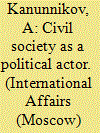

|
|
|
|
|
| Summary/Abstract |
THE PARTICIPATION of civil society in the politics of various countries is receiving increasing scholarly attention. Two clashing opinions regarding the place and role of civil society in today's world stand out in works written on this subject. Some researchers believe that civil society organizations should stay out of politics, while others insist that involving all civil society groups in the political process is vital to obtaining unique and accurate information necessary for political decision-making. Moreover, in European Union countries, for instance, persistent efforts have been made in recent years to improve governance mechanisms by drawing civil society into this integration organization at various levels [2].
|
|
|
|
|
|
|
|
|
|
|
|
|
|
|
|
| 2 |
ID:
155044
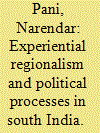

|
|
|
|
|
| Summary/Abstract |
Regional identities have periodically asserted themselves in Indian politics, both before and after Independence. The intensity of this regionalism has, however, tended to vary quite substantially from state to state and over time, ranging from a somewhat benign influence on state politics to demands for secession. These differences are typically explained in terms of specific local political conditions. While the local is undoubtedly important, this article argues that a larger theoretical explanation is also possible: Once we recognize that regionalism operates in multiple spaces, it becomes evident that the way these spaces are experienced has its influence on the practice of local politics. The article goes on to match its theoretical expectations with the politics of regionalism in the neighboring south Indian states of Karnataka and Tamil Nadu.
|
|
|
|
|
|
|
|
|
|
|
|
|
|
|
|
| 3 |
ID:
132938
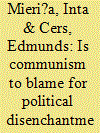

|
|
|
|
|
| Publication |
2014.
|
| Summary/Abstract |
In this article, we apply a new, original technique of cohort analysis to test empirically whether political disenchantment in the post-communist countries of Central and Eastern Europe can be linked to the previous political culture. On the basis of International Social Survey Programme 1996 and 2006 data we find a surprisingly similar and unique cohort effect in all analysed post-communist countries, reflecting persistent generational differences in perceived political competence (interest and understanding of political processes). However, the communist legacy does not seem to be important for explaining low self-efficacy or distrust in political authorities and their responsiveness to citizens' demands.
|
|
|
|
|
|
|
|
|
|
|
|
|
|
|
|
| 4 |
ID:
138849
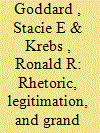

|
|
|
|
|
| Summary/Abstract |
This introductory framing paper theorizes the role of legitimation—the public justification of policy—in the making of grand strategy. We contend that the process of legitimation has significant and independent effects on grand strategy’s constituent elements and on how grand strategy is formulated and executed. Legitimation is integral to how states define the national interest and identify threats, to how the menu of policy options is constituted, and to how audiences are mobilized. Second, we acknowledge that legitimation matters more at some times than others, and we develop a model specifying the conditions under which it affects political processes and outcomes. We argue that the impact of legitimation depends on the government’s need for mobilization and a policy’s visibility, and from the intersection of these two factors we derive five concrete hypotheses regarding when legitimation is most likely to have an impact on strategy. Finally, we explore who wins: why legitimation efforts sometimes succeed in securing public assent, yet at other times fall short. Our framework emphasizes what is said (the content of legitimation), how it is said (technique), and the context in which it is said. We conclude by introducing the papers in this special issue, revisiting the larger theoretical stakes involved in studying rhetoric and foreign policy, and speculating about how changes in the technologies and sites of communication have, or have not, transformed legitimation and leadership in world politics.
|
|
|
|
|
|
|
|
|
|
|
|
|
|
|
|
| 5 |
ID:
138429
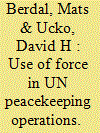

|
|
|
|
|
| Summary/Abstract |
Although the demand for UN peacekeepers shows little sign of abating, a sense of uncertainty and malaise continues to colour discussions about the future of UN peacekeeping. Of the many issues facing the UN High-Level Independent Panel on Peace Operations that was set up in 2014, the use of force by UN peacekeepers is likely to attract particular attention. It is also likely to prove divisive, both among member states and within the Secretariat. While steps can be taken to strengthen the capacity of the UN to mount and conduct field operations, Mats Berdal and David H Ucko argue that the way forward does not lie simply in entrusting UN forces with ever-more ‘robust’ war-fighting mandates. Instead, more systematic attention needs to be given to strategically linking UN peacekeeping activities to political processes aimed at bringing violent conflict to an end. This will require far greater honesty from member states regarding their own responsibility in enabling the UN to do what they ask of it.
|
|
|
|
|
|
|
|
|
|
|
|
|
|
|
|
|
|
|
|
|